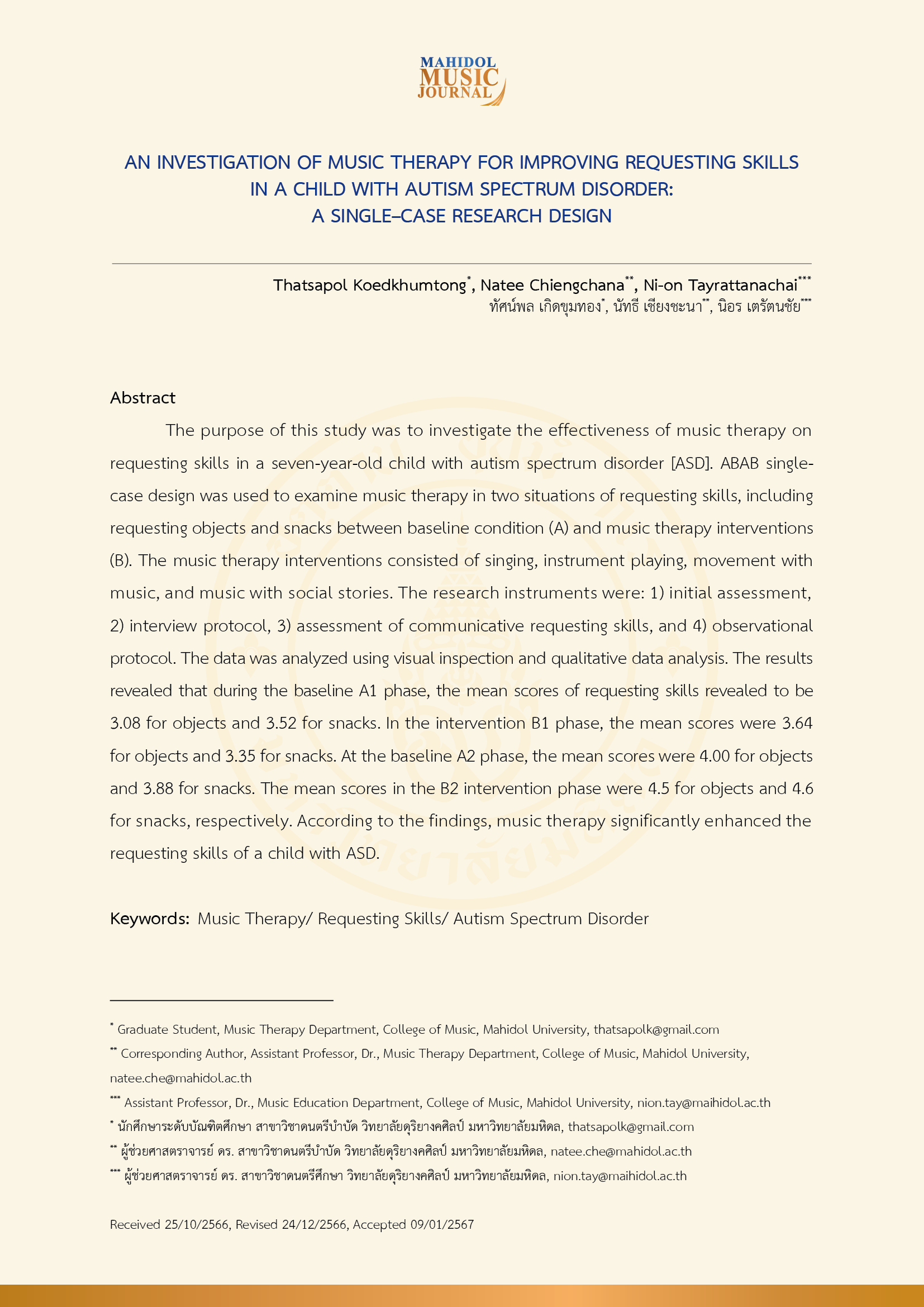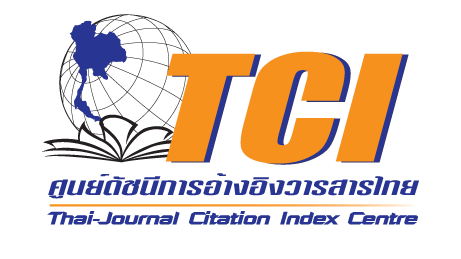AN INVESTIGATION OF MUSIC THERAPY FOR IMPROVING REQUESTING SKILLS IN A CHILD WITH AUTISM SPECTRUM DISORDER: A SINGLE–CASE RESEARCH DESIGN
Keywords:
Music Therapy, Requesting Skills, Autism Spectrum DisorderAbstract
The purpose of this study was to investigate the effectiveness of music therapy on requesting skills in a seven-year-old child with autism spectrum disorder [ASD]. ABAB single-case design was used to examine music therapy in two situations of requesting skills, including requesting objects and snacks between baseline condition (A) and music therapy interventions (B). The music therapy interventions consisted of singing, instrument playing, movement with music, and music with social stories. The research instruments were: 1) initial assessment, 2) interview protocol, 3) assessment of communicative requesting skills, and 4) observational protocol. The data was analyzed using visual inspection and qualitative data analysis. The results revealed that during the baseline A1 phase, the mean scores of requesting skills revealed to be 3.08 for objects and 3.52 for snacks. In the intervention B1 phase, the mean scores were 3.64 for objects and 3.35 for snacks. At the baseline A2 phase, the mean scores were 4.00 for objects and 3.88 for snacks. The mean scores in the B2 intervention phase were 4.5 for objects and 4.6 for snacks, respectively. According to the findings, music therapy significantly enhanced the requesting skills of a child with ASD.
References
American Music Therapy Association. “What Is Music Therapy,” 2005. https://www.musictherapy.org/about/musictherapy.
American Psychiatric Association. Diagnostic and Statistical Manual of Mental Disorders: DSM-5-TR. 5th ed. Washington, DC: American Psychiatric Association Publishing, 2013.
Applied Behavior Analysis Edu. “What Is Applied Behavior Analysis?” Accessed July 19, 2021. https://www.appliedbehavioranalysisedu.org/what-is-aba/.
Applied Behavior Analysis Edu. “Why Do Autistics Have Issues with Social Skills?” Last modified 2017. https://www.appliedbehavioranalysisedu.org/why-do-autistics-have-issues-with-social-skills/.
Austin, Sarita. “Communicative Functions.” In Encyclopedia of Autism Spectrum Disorders, 751-52. New York: Springer, 2013. https://doi.org/10.1007/978-1-4419-1698-3_964.
Autism Speaks Organization. “Pivotal Response Treatment (PRT).” Accessed September 27, 2021. https://www.autismspeaks.org/pivotal-response-treatment-prt-0.
Bland, Martin, and Douglas G. Altman. “Applying the Right Statistics: Analyses of Measurement Studies.” Ultrasound in Obstetrics & Gynecology 22, no. 1 (July 2003): 85-93. https://doi.org/10.1002/uog.122.
Brownell, Mike D. “Musically Adapted Social Stories to Modify Behaviors in Students with Autism: Four Case Studies.” Journal of Music Therapy 39, no. 2 (Summer 2002): 117-44. https://doi.org/10.1093/jmt/39.2.117.
Cambridge Dictionary. “Request Definition.” Accessed August 11, 2021. https://dictionary.cambridge.org/dictionary/english/request.
Charoenphol, Chanyanit, Natee Chiengchana, and Ni-On Tayrattanachai. “The Effects of Parent-Child Interactive Music Therapy on Sentence Verbalisation in a Child with Autism Spectrum Disorder: A Case Study.” Malaysian Journal of Music 8 (2019): 86-95. https://doi.org/10.37134/mjm.vol8.5.2019.
Davis, William, Kate Gfeller, and Michael Thaut. An Introduction to Music Therapy: Theory and Practice. 3rd ed. Silver Spring, MD: The American Music Therapy Association, 2008.
Gattino, Gustavo Schulz, Rudimar dos Santos Riesgo, Dânae Longo, Júlio César Loguercio Leite, and Lavina Schüler Faccini. “Effects of Relational Music Therapy on Communication of Children with Autism: A Randomized Controlled Study.” Nordic Journal of Music Therapy 20, no. 2 (2011): 142-54. https://doi.org/10.1080/08098131.2011.566933.
Intawan, Chatchawan, Natee Chiengchana, and Teerasak Srisurakul. “Use of Video Modeling to Promote Learning Skills in Children with Autism Spectrum Disorder: A Literature Review.” Journal of Ratchasuda College for Research and Development of Persons with Disabilities 18, no. 1 (January-June 2022): 21-36. https://so03.tci-thaijo.org/index.php/RSjournal/article/view/261520.
Jennett, Heather K., Sandra L. Harris, and Lara Delmolino. “Discrete Trial Instruction vs. Mand Training for Teaching Children with Autism to Make Requests.” The Analysis of Verbal Behavior 24, no. 1 (April 2008): 69-85. https://doi.org/10.1007/bf03393058.
Kawinnithiporn, Chwanphatz. “The Effect of Music Therapy on Expressive Communication Skill in a Child with Autism Spectrum Disorder.” Journal of Ratchasuda College for Research and Development of Persons with Disabilities 14 (January-December 2018). https://rs.mahidol.ac.th/rs-journal/eng/vol.14/vol.14-002.php.
Kern, Petra, and Marcia Humpal. Early Childhood Music Therapy and Autism Spectrum Disorders: Developing Potential in Young Children and Their Families. London: Jessica Kingsley Publishers, 2012.
Kern, Petra, Mark Wolery, and David Aldridge. “Use of Songs to Promote Independence in Morning Greeting Routines for Young Children with Autism.” Journal of Autism and Developmental Disorders 37, no. 7 (August 2007): 1264-71. https://doi.org/10.1007/s10803-006-0272-1.
King, Cacia. “More Than Just Greeting Songs.” Listen & Learn Music. Last modified September 21, 2018. https://listenlearnmusic.com/more-than-just-greeting-songs/.
Leung, Jin -Pang. “Teaching Spontaneous Requests to Children with Autism Using a Time Delay Procedure with Multi-Component Toys.” Journal of Behavioral Education 4, no. 1 (March 1994): 21-31. https://doi.org/10.1007/BF01560506.
Lim, Hayoung A. “Use of Music in the Applied Behavior Analysis Verbal Behavior Approach for Children with Autism Spectrum Disorders.” Music Therapy Perspectives 28, no. 2 (2010): 95-105. https://doi.org/10.1093/mtp/28.2.95.
McKay, Dean. Handbook of Research Methods in Abnormal and Clinical Psychology. Thousand Oaks, CA: SAGE Publications, Inc, 2007.
Oldfield, Amelia. “Parents’ Perceptions of Being in Music Therapy Sessions with Their Children: What Is Our Role as Music Therapists with Parents?” In Music Therapy and Parent-Infant Bonding, Edited by Jane Edwards, 58-72. Oxford: Oxford University Press, 2011. https://doi.org/10.1093/acprof:oso/9780199580514.003.0005.
Organization for Autism Research. “What to Do When a Tantrum Happens.” Accessed December 21, 2020. https://researchautism.org/what-to-do-when-a-tantrum-happens/.
Paparella, Tanya, Kelly Stickles Goods, Stephanny Freeman, and Connie Kasari. “The Emergence of Nonverbal Joint Attention and Requesting Skills in Young Children with Autism.” Journal of Communication Disorders 44, no. 6 (November-December 2011): 569-83. https://doi.org/10.1016/j.jcomdis.2011.08.002.
Patricelli. “Social Communication and Social Interaction Issues - Autism Spectrum Disorder.” Last modified 2021. https://www.gracepointwellness.org/20-autism-spectrum-disorder/article/8764-social-communication-and-social-interaction-issues.
Play Therapy Ireland. “Axline’s Basic Principles of Non-Directive Play Therapy.” Accessed 2023. https://playtherapy.ie/axlines-basic-principles-of-non-directive-play-therapy.
Robb, Sheri, Debra Burns, and Janet Carpenter. “Reporting Guidelines for Music-Based Interventions.” Music and Medicine 3, no. 4 (2011): 271-79. https://doi.org/10.1177/1943862111420539.
Still, Katharine, Richard J. May, Ruth Anne Rehfeldt, Robert Whelan, and Simon Dymond. “Facilitating Derived Requesting Skills with a Touchscreen Tablet Computer for Children with Autism Spectrum Disorder.” Research in Autism Spectrum Disorders 19 (November 2015): 44-58. https://doi.org/10.1016/j.rasd.2015.04.006.
Swaggart, Brenda L., Elisa Gagnon, Stacey Jones Bock, Theresa L. Earles, Colleen Quinn, Brenda Smith Myles, and Richard L. Simpson. “Using Social Stories to Teach Social and Behavioral Skills to Children with Autism.” Focus on Autistic Behavior 10, no. 1 (April 1995): 1-16. https://doi.org/10.1177/108835769501000101.
Watson Institute. “Early Mand Training in Special Education.” Accessed September 6, 2021. https://www.thewatsoninstitute.org/watson-life-resources/situation/teaching-requesting-early-mand-training/.
Weisberg, Holly R., and Emily A. Jones. “Individualizing Intervention to Teach Joint Attention, Requesting, and Social Referencing to Children with Autism.” Behavior Analysis in Practice 12, no. 1 (March 2019): 105-23. https://doi.org/10.1007/s40617-018-0265-5.
Wheeler, Barbara L. “Humanistic Approaches.” In Music Therapy Handbook, 148-56. New York: The Guilford Press, 2015. https://digitalcommons.montclair.edu/all_books/85/.
World Federation of Music Therapy. “What is Music Therapy?” Last modified 2011. https://wfmt.info/wfmt-new-home/about-wfmt/.
World Health Organization. “Autism Spectrum Disorders.” Accessed June 1, 2021. https://www.who.int/news-room/fact-sheets/detail/autism-spectrum-disorders.
Yum, Yen Na, Way Kwok-Wai Lau, Kean Poon, and Fuk Chuen Ho. “Music Therapy as Social Skill Intervention for Children with Comorbid ASD and ID: Study Protocol for a Randomized Controlled Trial.” BMC Pediatrics 20, no. 1 (December 2020). https://doi.org/10.1186/s12887-020-02454-6.

Downloads
Published
How to Cite
Issue
Section
License
Copyright (c) 2024 College of Music

This work is licensed under a Creative Commons Attribution-NonCommercial-NoDerivatives 4.0 International License.
The copyright of the article belongs to the author. Published articles represent the views of the authors. The editorial team neither necessarily agree with nor take any responsibility for the article.





